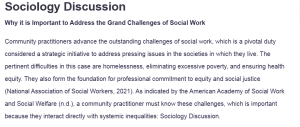Sociology Discussion
Why it is Important to Address the Grand Challenges of Social Work
Community practitioners advance the outstanding challenges of social work, which is a pivotal duty considered a strategic initiative to address pressing issues in the societies in which they live. The pertinent difficulties in this case are homelessness, eliminating excessive poverty, and ensuring health equity. They also form the foundation for professional commitment to equity and social justice (National Association of Social Workers, 2021). As indicated by the American Academy of Social Work and Social Welfare (n.d.), a community practitioner must know these challenges, which is important because they interact directly with systemic inequalities: Sociology Discussion.
Their ability to understand is significant because they can use it to address the direct causes of social challenges. They can also use the understanding to promote lasting change through stakeholder collaboration (National Association of Social Workers, 2021). The same can also inform their advocacy for policy changes and seeking resources that can be used to empower marginalized communities.
The community organizer addresses problems at a macro level, which is important and different from social work practices like clinical work that is only interested in individual treatment. This being the case, practitioners should apply the code of ethics as enshrined in the NASW Code of Ethics (National Association of Social Workers, 2021). Some principles they should manifest are promoting the dignity and worth of every individual and promoting social justice. For example, community practitioners can be involved in capacity building and advocate for favorable housing policies to ensure equitable access to homes for vulnerable groups.
This approach to solving issues differs from the approach in the clinical setting, where the emphasis is on helping people cope with situations like housing instability. Also, community practitioners can use the approach where grand challenges are integrated by adopting collective approaches to solve these problems (American Academy of Social Work and Social Welfare, n.d.). Therefore, community practitioners can create transformative change through aligning their work with adherence to the NASW Code of Ethics and aligning their work with the grand challenges.
References
American Academy of Social Work and Social Welfare. (n.d.). Grand challenges for social work. https://grandchallengesforsocialwork.org/
National Association of Social Workers. (2021). Code of ethics of the National Association of Social Workers. NASW Press.
ORDER A PLAGIARISM-FREE PAPER HERE
We’ll write everything from scratch
Question
After reviewing the Grand Challenges for Social Work, and watching the Noontime Knowledge Webinar, reflect upon the content. In a post of at least 300 words, answer the following:
- Why is it important for community practitioners to be knowledgeable of and involved in addressing the Grand Challenges?
- How might community organizers and practitioners apply the NASW Code of Ethics principles and the Grand Challenges in ways that are different from processes used in other types of social work practice (e.g., clinical setting)?
Sociology Discussion


